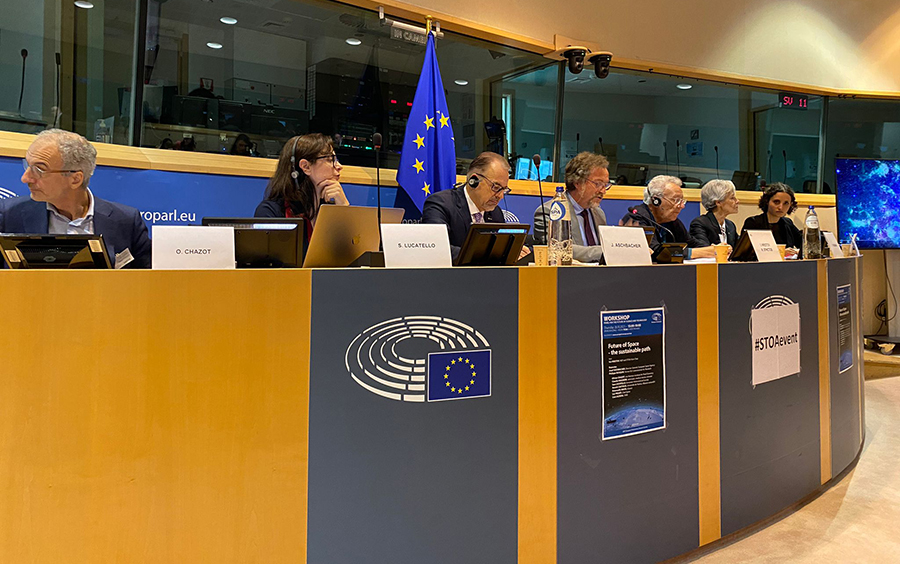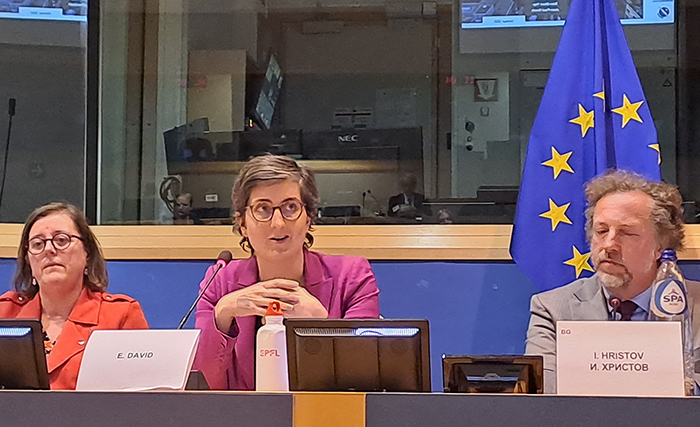30.10.2023 - On October 26, Vice President of the Space Sustainability Rating Association and Executive Director of the EPFL Space Center Emmanuelle David went to Brussels to address the European Parliament’s Panel for the Future of Science and Technology (STOA) on “The Future of Space - the Sustainable Path”. She spoke about the important role that the Space Sustainability Rating (SSR) plays in incentivizing sustainable behaviour in space and also highlighted EPFL’s activities in the field.
The STOA is the scientific foresight unit for the European Parliament Research Service. The panel included other notable space experts including ESA Director Josef Aschbacher, former EU Commissioner for Research Philippe Busquin, and ClearSpace CEO and co-founder Luc Piguet. The event was especially timely as there is a consultation on the EU Space law and could inform the MEP and their staff about the status of the research and remaining challenges.
The panel addressed the many different aspects of space sustainability. In the first panel, speakers focused on the topic from the exploration perspective, looking at the impacts of increased space activity on the atmosphere and dark and quiet skies. The second panel looked more at the economic side, with an introduction on the challenges of the economic development of space, the presentation of the SSR tool, and concluded in the presentation of ClearSpace about the emergence of in-orbit services.

A tool for a fair, competitive and sustainable space industry
The main focus of David’s presentation was the Space Sustainability Rating. She explained to the audience how the use of a sustainability label, like SSR, incentivizes sustainable behaviour while ensuring a fair and competitive industry.
“The SSR is a new, innovative, way to incentivize safer conditions for operating in space that doesn’t discourage or shame operators,” she explained. “Rather, it offers an acknowledgment of actions that space operators are taking to ensure safer missions. It is an initiative that seeks to foster voluntary actions by satellite operators to reduce the risks related to space debris and on-orbit collisions.”
David then went on to explain how the rating works, explaining how it is performed, the services and advice that operators receive from the association along with the rating itself, and the many ways that companies and operators benefit from receiving a rating on their mission.
“From discussions with rated companies, we have learned that receiving a rating brings many important advantages. When building their business case to perform a rating, companies have mentioned the following elements – enhancing reputation and trust, competitive advantage, attracting investors, regulatory compliance, risk mitigation, long-term viability, and marketing and public relations. Furthermore, a space sustainability rating can significantly improve satellite operations.”

David also highlighted policy options that could be developed along with the SSR and that are also in line with EU Space Law, such as:
- Financial and economic incentives;
- Support for current and potential regulations;
- Altered procurement processes;
- Public perception; and
- Marketing and environmental, social, and governance-style corporate reporting.
She also outlined two on-going studies about how the SSR, as an example, can go along with policy development for Earth-space sustainability in the future and how national governments can use the SSR while developing their space traffic management framework. The results of these studies are shared in international fora such as the OECD Space Forum, the Paris Peace Forum working groups, the ESA Zero Debris Charter and IAA Space traffic management working group.
“With the Space Sustainability Rating, we act to design and implement sustainable and responsible space missions for the long-term sustainability of the space environment. Our mission is to support actors in the industry to turn their commitment into real action by using our performance tools demonstrating their efforts. We hope we can continue our work with governments and policy makers.”